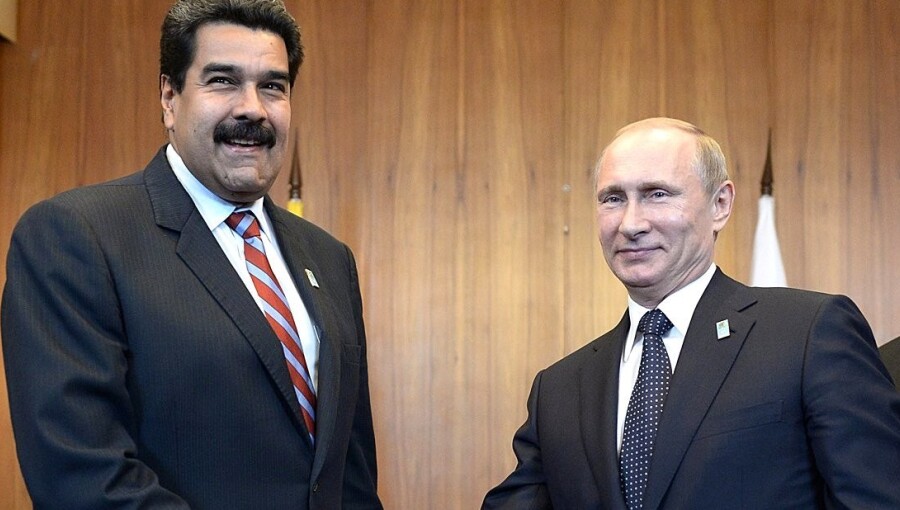Is Venezuela Europe’s answer for the loss of Russian oil?

The US government appears to be moving towards loosening restrictions on trade with Venezuela, at least partly out of a desire to address disruptions on the European oil market
WHAT: More reports have emerged indicating that Washington is looking to soften sanctions policy.
WHY: The US aims to facilitate talks between Maduro and the opposition, but it is also keen to see Venezuela produce more oil that can be exported to Europe.
WHAT NEXT: PdVSA is not in a position to have much of an impact on European crude markets, but it would stir interest if it returned to the USGC region amidst a broader shift in global trade flows.
As NewsBase has noted, the US government is reported to be moving towards loosening the restrictions placed on trade with Venezuela.
One source familiar with the matter told Bloomberg last week that Washington was looking to lift some of the sanctions placed on Venezuela’s national oil company (NOC) PdVSA. According to the source, the policy shift aims to facilitate crude exports to foreign markets, especially by Eni (Italy) and Repsol (Spain), while also allowing the US major Chevron to renegotiate its Venezuelan licences and smoothing the way toward negotiations between President Nicolas Maduro’s administration and the Venezuelan political opposition.
Other newswires have issued similar reports. The Associated Press, for example, quoted two senior US officials as saying last week that the administration of US President Joe Biden was making some limited revisions to the sanctions regime in order to ease the path toward negotiations between Caracas and the Venezuelan opposition.
Specifically, the officials said, the Biden administration will remove Carlos Erik Malpica-Flores, PdVSA’s former vice president of finance and a nephew of Venezuela’s first lady Cilia Adela Flores de Maduro, from the US Treasury Department’s list of sanctioned individuals. It will also permit Chevron to negotiate its operating licence with PdVSA, though this permission will not extend to any drilling or production activities, they stated. (They spoke to AP on condition of anonymity, as no formal announcements have yet been made on changes in US policy.)
More recently, Reuters has said that Chevron will see its licence to operate in Venezuela reinstated very soon. Four people close to the talks told the news agency on May 24 that the Treasury Department was preparing to renew the licence, even though it probably would not agree to grant permission to operate on the expanded terms that the oil company had requested.
US politicians react
It remains to be seen how quickly these changes take hold.
More than a week has passed since AP and Bloomberg went public with reports on the possibility of a policy shift, and the US government has made no official announcements on this front. (Venezuela’s Vice President Delcy Rodriguez, by contrast, posted a statement on her Twitter account trumpeting that Washington had authorised US and European companies to “negotiate and restart operations” in her country.)
Meanwhile, reports of a possible softening in the sanctions regime have drawn a frosty response from some US politicians. For example, Bob Menendez, the New Jersey Democrat who serves as chairman of the Senate Foreign Relations Committee, issued a statement last week criticising the idea of taking Malpica-Flores off the list of sanctioned individuals. Any plan that relies on giving Maduro “a handful of undeserved handouts” in the hope that he will negotiate with his political opponents “is a strategy destined to fail,” the statement declared.
Menendez later reiterated this sentiment, telling reporters: “Removing Flores from the list of sanctioned people is obviously a gift to Maduro.”
For his part, John Barrasso, the top-ranking Republican on the Senate Energy and Natural Resources Committee, said he did not want to see the US government striking deals with authoritarian regimes such as the one headed by Maduro. He also urged Washington to make the US oil and gas industry a higher priority than PdVSA. “Our experience buying Russian energy should have taught President Biden that buying energy from tyrants is a dangerous proposition ... Funding despots isn’t in the national interest; supporting American energy is,” he said in a statement.
As of press time, the Biden administration has not made any official statements about its stance on Venezuela. However, the events reported above appear to signal that there is a US policy shift in the works. Moreover, they also seem to indicate that one of the considerations driving this shift is Washington’s desire to stabilise world crude oil markets.
US miscalculations
Unfortunately, though, they may also indicate that the Biden administration does not have a very deep understanding of world crude oil markets – or at least, to give those involved the benefit of the doubt, is not bothering to communicate its understanding and intentions very clearly.
One of the more interesting statements made by Bloomberg source last week was that Washington was taking this step partly because it wanted Eni and Repsol, the only two foreign companies still operating in Venezuela, to be able to deliver more crude to the European market. With that barrier lifted, the source said, Europe should have an easier time covering demand and overcoming the supply disruptions resulting from the interruptions in Russian crude deliveries, he said.
According to Bloomberg’s report, this assistance for Europe may come at the expense of other parties. One of the multiple sources cited by the news agency said that Eni and Repsol were working with US authorities to divert cargoes of Venezuelan crude heading for China to the European market.
What can Venezuela do?
It’s not clear how much impact such moves are expected to have – or, indeed, what kind of impact.
Prior to the invasion of Ukraine in late February, European countries were importing around 2.3mn barrels per day of crude from Russia, and delivery volumes were reported to be down by about 20% as of mid-April. That would put them at around 1.84mn bpd – and that’s a figure that Venezuela has no hope of matching any time soon.
The South American country is currently producing about 700,000 bpd and has to keep some of these barrels back for its own use, and it won’t be in any position to boost output substantially unless PdVSA secures supplies of several different types of goods and services. It needs parts and equipment to repair its production and processing complexes, as well as its pipelines and ports, and it also needs experts and technicians to help carry out these repairs, which have been neglected for several years. The NOC also needs more gas condensate and other blendstocks so that it can combine its own extra-heavy crude oil output to make a lighter synthetic fuel that is of more interest to customers.
On that note, it’s worth remembering that PdVSA has historically not sold much oil in Europe. The company doesn’t have a huge customer base in the European market, mostly because its offerings are not much in demand among refiners in Europe. (This is true for both its heavy/extra-heavy crudes and its lighter blended synthcrudes; many European refiners would rather have light sweet crudes from the North Sea or West Africa or medium sours from the Middle East or Russia than heavier, tar-like grades from South America.)
Shifting global trade flows
As such, even if the US government were to remove the threat of sanctions penalties from Eni and Repsol, those two companies would not necessarily find that European refiners would be eager to buy Venezuelan crude to make up for their loss of access to Russian feedstock.
They might very well find, though, that US Gulf Coast (USGC) refiners would be happy to buy as much of their Venezuelan oil as possible, provided that they were not penalised for doing so under the sanctions regime. After all, many USGC refineries are set up to handle heavy crudes of the type produced by Venezuela, and they have not been able to buy from their former main supplier for the last few years.
If Eni and Repsol (and eventually Chevron, assuming that it is able to move past the negotiation stage) started moving Venezuelan oil into the US market, they would not really displace any US oil production. As previously mentioned, many USGC refineries are set up to process heavy sours rather than light sweets, and most US barrels consist of light sweets. However, having extra supplies coming into the USGC region might help support a shift in trade flows that would see additional volumes of US oil moving into Europe.
If so, it would probably be those extra barrels that helped the Continent overcome the disruptions arising from the Russian war on Ukraine – not Venezuelan production per se, but a shift in global trade flows that involved both Venezuelan and US crude against a backdrop of contributing factors. This shift is not likely to happen quickly, though, as Venezuela’s oil sector is still not in a position to make up for the loss of 20% of Russia exports to Europe – especially since that number is likely to grow bigger as the EU moves ahead with plans to reduce reliance on Russian energy.





Follow us online